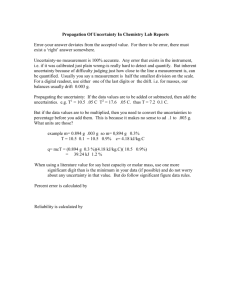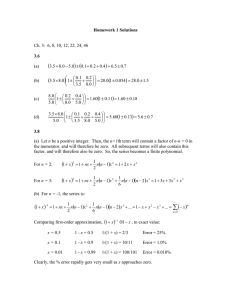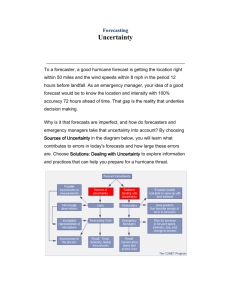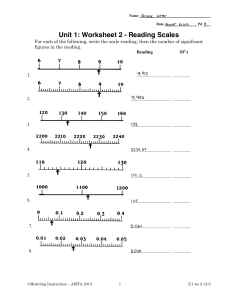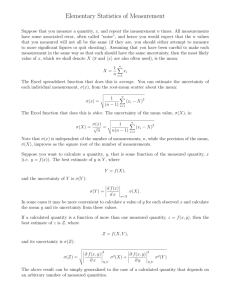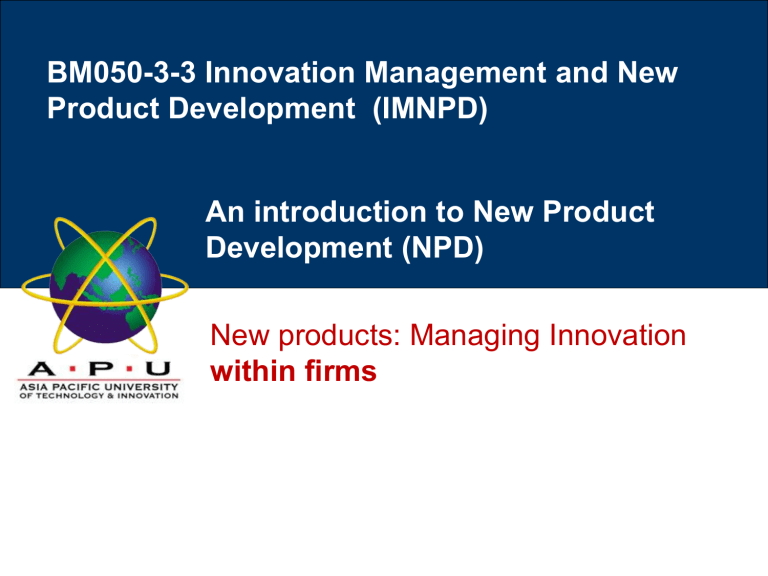
BM050-3-3 Innovation Management and New Product Development (IMNPD) An introduction to New Product Development (NPD) New products: Managing Innovation within firms New Product DevelopmentManaging Innovation within firms Learning Objectives Identify the factors organizations have to manage to achieve success in innovation Explain the dilemma facing all organizations concerning the need for creativity and stability Recognize the difficulties of managing uncertainty Module Code and Module Title Title of Slides New Product DevelopmentManaging Innovation within firms Learning Objectives Identify the factors organizations have to manage to achieve success in innovation Explain the dilemma facing all organizations concerning the need for creativity and stability Recognize the difficulties of managing uncertainty Module Code and Module Title Title of Slides Dilemma of Innovation Management Fundamental tension between opposing needs: stability vs creativity. Companies require high levels of productivity and control to compete in today’s world. Reduce costs and inefficiencies. On the other hand also need to develop new ideas and new products to be competitive in future. Need environment to test new ideas. Module Code and Module Title Title of Slides Pearson’s Uncertainty Map High 3. Applications engineering 1. Exploratory research 4. Combining market opportunities 2. Development engineering Uncertainty about output (what) Low High Uncertainty about process (how) Module Code and Module Title Title of Slides Managing UncertaintyPearson’s Uncertainty Map Provides a framework for analyzing and understanding uncertainty and the innovation process Divides uncertainty into two separate dimensions: Uncertainty about ends / output (what is eventual target of the activity or project) Uncertainty about means / process (how to achieve this target) Module Code and Module Title Title of Slides Pearson’s Uncertainty Map Quadrant 1 Exploratory Research High degree of uncertainty about means and ends Ultimate target is not clearly defined and how to achieve is not clear “Exploratory research”, activities often involve working with technology not fully understood E.g. University research laboratory Large organizations that have the necessary resources to fund such exploratory studies. Module Code and Module Title Title of Slides Pearson’s Uncertainty Map Quadrant 2 Development Engineering The end or target is clear E.g. Commercial opportunity may have been identified but the means of fulfilling this has not be established Different technologies or different approaches to try to achieve the desired product Additional approaches may be uncovered along the way. Considerable uncertainty about precisely how company will achieve its target. looking at production processes, efficiencies, reducing costs. Module Code and Module Title Title of Slides Pearson’s Uncertainty Map Quadrant 3 Applications Engineering Uncertainty regarding ends /destination / target Attempts to discover how technology can be most effectively used Application engineering New materials used in manufacturing fall into this area. Eg Velcro - hook-and-loop fasteners Many may be ineffective due to costs or performance, some new and improved products will emerge from this effort. Module Code and Module Title Title of Slides Pearson’s Uncertainty Map Quadrant 4 Combining market opportunities Area of the most certainty in innovative activities Situation dominated by improving existing products or creating new products through the combination of a market opportunity and technical capability Speed of development is often the key to success Minimal new technology with focus on the appearance or performance of an existing product E.g. Iphone with new designs rapidly into market Module Code and Module Title Title of Slides Organization characteristics that facilitate the innovation process 1. Growth Orientation A commitment to long term growth rather than short term profit 2. Organizational heritage and innovation experience • Widespread recognition of the value of innovation, cooperation among groups , departments. 3. Vigilance and external links Continual external scanning, keep up with latest development, competitor analysis, open flow of info 4. Commitment to technology and R&D intensity The willingness to invest in long term development of technology Module Code and Module Title Title of Slides Organization characteristics that facilitate the innovation process 5. Acceptance of risks • The willingness to include risky opportunities in a balanced portfolio 6. Cross functional cooperation and coordination within organization structure • Mutual respect among individuals and a willingness to work together across functions 7. Receptivity The ability to be aware of, identify and take effective advantage of externally developed technology Module Code and Module Title Title of Slides Organization characteristics that facilitate the innovation process 8. Space for creativity An Ability to manage the innovation dilemma and provide room for creativity 9. Strategy towards innovation Strategic planning and selection of technologies and markets 10.Diverse range of skills Developing a marketable product requires combining a wide range of specialized knowledge Module Code and Module Title Title of Slides New Product DevelopmentManaging Innovation within firms Learning Objectives Explain the dilemma facing all organizations concerning the need for creativity and stability Recognize the difficulties of managing uncertainty Identify the factors organizations have to manage to achieve success in innovation Module Code and Module Title Title of Slides Organizational structures and innovation 1. Formalization Inverse relationship between formalization and innovation Formalization of procedures will result in a decrease in innovative activity Argument: Organization planning and routines are necessary for achieving efficiencies 2. Complexity of organization Complexities refers to the number of professional groups or diversity of specialists e.g. Hospital – Doctors, Nurses, Wide range of Specialist Good supply: Complex distribution all over country but not wide range of highly qualified professional groups Module Code and Module Title Title of Slides Organizational structures and innovation 3. Centralization Refers to the decision making activity and location of power Fewer levels of hierarchy are required Lead to more responsive decision closer to the action 4. Organization size Economic and organization resources e.g. Employees and scale of operation 20 employees differs significantly in terms of resources from and organization of 200 or 2000 employees Module Code and Module Title Title of Slides Establishing an innovative environment and propagating this virtuous circle Attraction of creative people The organization’s reputation for innovation Organizational encouragement of creativity and innovation High morale and retention of creative people Motivates people within the organization and reduces frustration Module Code and Module Title Development of innovative products A willingness within the organization to accept new ideas Title of Slides Establishing an innovative environment and propagating this virtuous circle 1. Reputation of the organization Reputation takes years to develop Strongly linked to overall performance Factors: 1) recent product launches, 2) Success of the programs 3) High level of expenditure on R&D 2. Attraction of creative people Creative organization attract creative people Top scientist will seek employment with those companies which have a reputation for innovation and scientific excellence Module Code and Module Title Title of Slides Establishing an innovative environment and propagating this virtuous circle 3. Organization encourages creativity Creativity has to be supported with actions and resources rather than just lip services Build an environment that tolerates errors and mistakes Successful new ideas need to be rewarded in terms of publicity involved 4. Development of innovative products Genuine improvements compared with products currently available Success in current market place that leads to further success Module Code and Module Title Title of Slides Establishing an innovative environment and propagating this virtuous circle 5. A willingness to accept new ideas Many organization suffer from inability to implement changes and new ideas It is important that it is carried through to completion 6. Increased motivation and reduced frustration Individual contribution to the overall performance of the business Good ideas that are constantly overlooked will lead to increased frustration Module Code and Module Title Title of Slides Establishing an innovative environment and propagating this virtuous circle 7. High Moral and retention of creative people All preceding activities will help contribute to increased moral A rewarding and enjoyable working environment will help retain creative people Reinforce the company’s innovative capabilities Module Code and Module Title Title of Slides Tutorial 1. Discuss the main organizational characteristics that facilitate the innovation process? 2. Explain the key individual roles within the innovation process and the activities they perform. Module Code and Module Title Title of Slides
